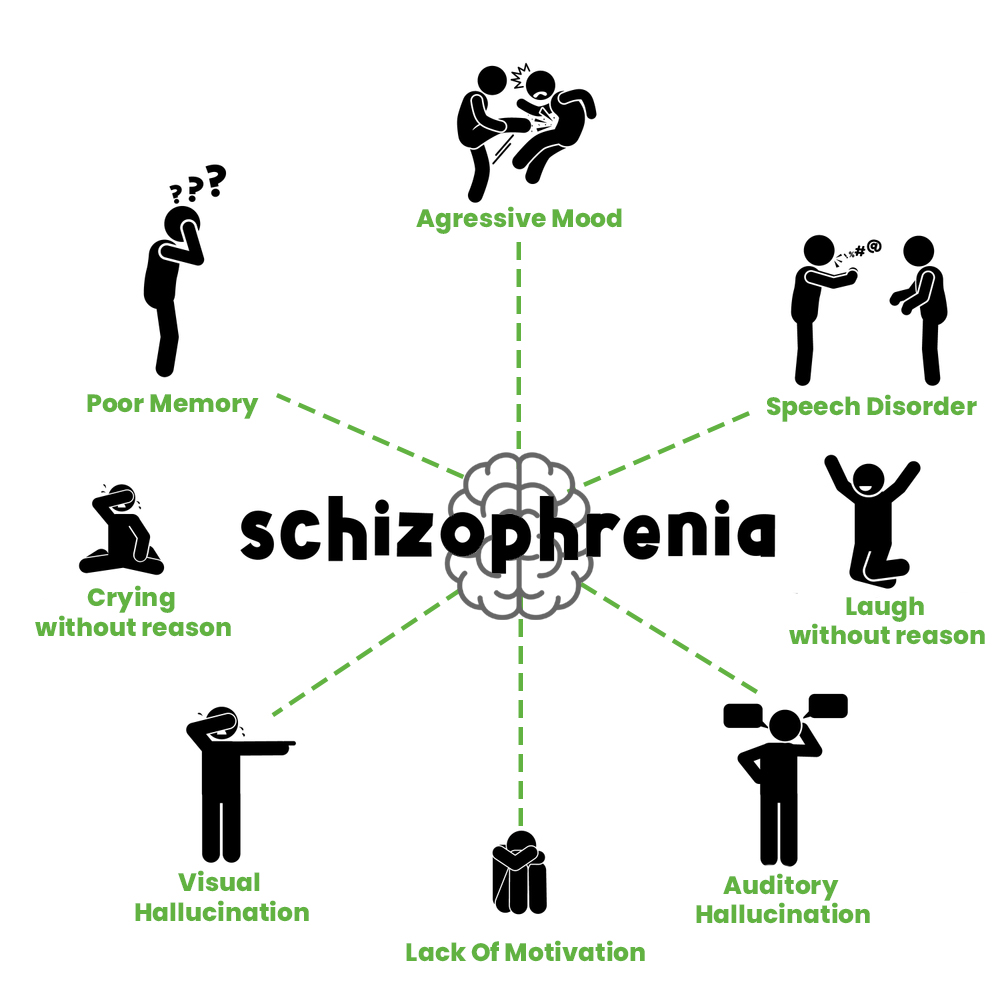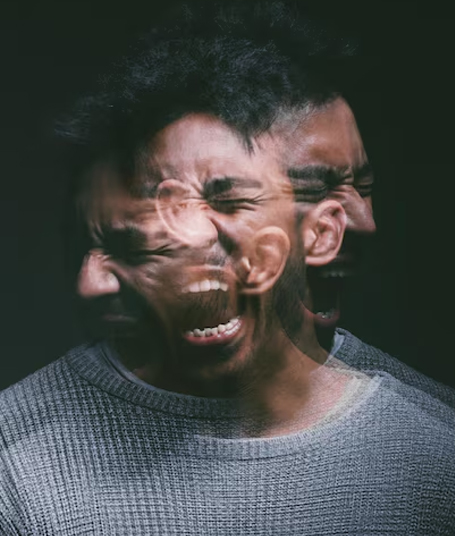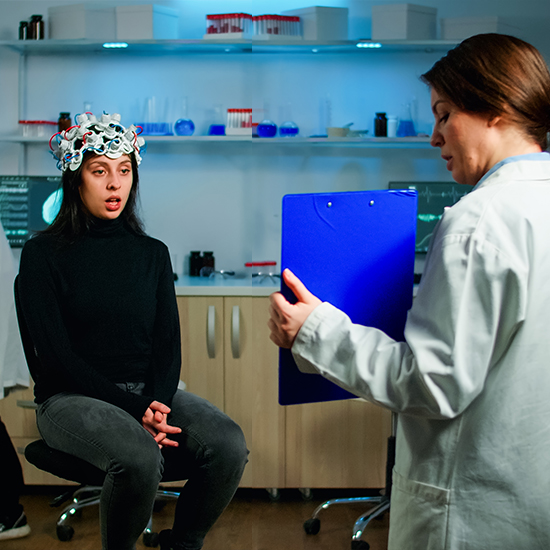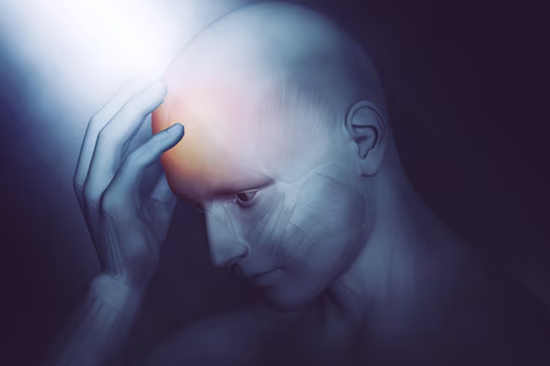
Schizophrenia: Symptoms, Causes, Diagnosis, and Treatment
Schizophrenia is a severe mental health condition characterised by distortions in thinking, perception, emotions, and behaviour. It is classified as a psychotic disorder, meaning individuals often lack insight into the unreality of their symptoms. Schizophrenia typically emerges in the early to mid-20s for men and the late 20s for women. It is rare in children and adults over 45.
The condition involves a range of cognitive, behavioural, and emotional challenges, often including delusions, hallucinations, and disorganised speech. These symptoms can significantly impair daily functioning and quality of life.
Symptoms of Schizophrenia
Schizophrenia symptoms are broadly categorised into positive symptoms (added experiences) and negative symptoms (loss of normal functions). Common symptoms include:
1. Positive Symptoms:
- ✔ Delusions: Strongly held false beliefs that cannot be explained by the individual’s culture or education. Types include:
- ✔ Persecutory delusions (feeling targeted or spied on).
- ✔ Grandiose delusions (believing one has special powers or importance).
- ✔ Delusions of reference (believing random events are personally significant).
- ✔ Hallucinations: Vivid sensory experiences without external stimuli. These can involve:
- ✔ Hearing voices (most common).
- ✔ Seeing, feeling, or smelling things that aren’t there.
- ✔ Disorganised Thinking: Inferred from speech patterns, such as:
- ✔ Incoherent or unrelated responses to questions.
- ✔ Word salad (jumbling meaningless words together).
- ✔ Disorganised or Abnormal Behaviour:
- ✔ Childlike silliness or unpredictable agitation.
- ✔ Catatonia (lack of movement or excessive, purposeless movement).
2. Negative Symptoms:
- ✔ Reduced Emotional Expression: Flat or blunted affect (lack of emotional response).
- ✔ Avolition: Loss of motivation or interest in daily activities.
- ✔ Alogia: Reduced fluency or productivity of speech.
- ✔ Social Withdrawal: Difficulty maintaining relationships or engaging socially.
Causes of Psychosis and Schizophrenia
The exact cause of schizophrenia is unknown, but it is believed to result from a combination of factors:
1. Genetic Factors:
- A family history of schizophrenia or other psychotic disorders increases risk.
- Specific genes may play a role in brain development and neurotransmitter regulation.
2. Neurochemical Factors:
- Imbalances in brain chemicals, particularly dopamine and glutamate, are linked to psychotic symptoms.
3. Environmental Factors:
- Prenatal exposure to infections, malnutrition, or stress.
- Childhood trauma or adverse experiences.
- Substance use (e.g., cannabis, amphetamines) during adolescence or early adulthood.
4. Brain Structure and Function:
- Abnormalities in brain structure (e.g., enlarged ventricles) and function (e.g., reduced activity in the prefrontal cortex).


Differential Diagnosis
Schizophrenia must be distinguished from other conditions with similar symptoms, including:
- ✔ Bipolar Disorder: Manic episodes may include psychotic symptoms, but bipolar disorder is characterised by distinct mood episodes (mania and depression).
- ✔ Major Depressive Disorder with Psychotic Features: Psychotic symptoms occur only during depressive episodes.
- ✔ Substance-Induced Psychosis: Psychotic symptoms triggered by substance use (e.g., cannabis, cocaine).
- ✔ Delusional Disorder: Persistent delusions without other psychotic symptoms (e.g., hallucinations, disorganised speech).
- ✔ Personality Disorders: Schizotypal personality disorder may resemble schizophrenia but lacks the severity of psychotic symptoms.
- ✔ Medical Conditions: Brain tumours, epilepsy, or infections (e.g., encephalitis) can cause psychotic symptoms.
Treatment Options Based on NICE Guidelines
The National Institute for Health and Care Excellence (NICE) provides evidence-based recommendations for treating schizophrenia. Treatment options include:
- First-Generation Antipsychotics (FGAs): Such as haloperidol or chlorpromazine.
- Second-Generation Antipsychotics (SGAs): Preferred due to fewer side effects (e.g., olanzapine, risperidone, quetiapine).
- Medication is tailored to individual needs and monitored for effectiveness and side effects.
- Cognitive Behavioural Therapy for Psychosis (CBTp): Helps individuals challenge and change unhelpful thoughts and behaviours.
- Family Intervention: Involves family members in treatment to improve communication and reduce relapse risk.
- Arts Therapies: Creative therapies to help express emotions and improve social interaction.
- Supported employment and education programs.
- Housing and community support services.
- Hospitalisation during acute episodes for safety and stabilisation.
- Crisis plans developed with healthcare providers to manage relapses.
- Regular follow-ups with mental health professionals.
- Monitoring for physical health issues, as schizophrenia is associated with higher risks of conditions like diabetes and cardiovascular disease.

Take the First Step Toward Stability
If you or a loved one is struggling with schizophrenia symptoms, don’t wait to seek help. Contact New Healing Solutions Clinic (NHSC) today for an expert assessment and personalised treatment plan. Begin your journey to improved mental health and well-being.
Address
Woodland Drive Medical Centre Woodland Drive Barnsley S70 6QW
Contact NHSC today
01226 282 535Send us a Mail
info@newhealingsolutions.co.ukOpening Time
9am to 5pm - Monday to Friday


